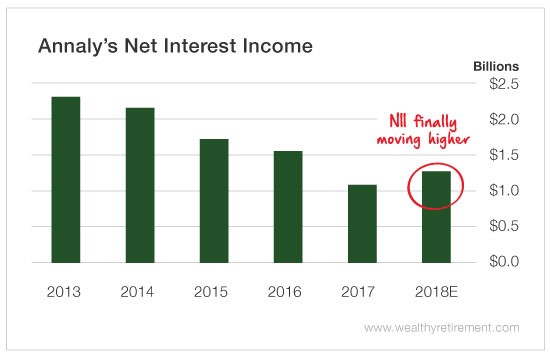A common question I receive from readers of my Oxford Income Letter is “Why are you recommending stocks that are rated F?”
Usually, it’s because we’re willing to take the risk in order to capture a very high dividend yield or things are improving at the company. Sometimes both.
That’s the situation with Annaly Capital Management (NYSE: NLY), a mortgage real estate investment trust (REIT) that yields 11%.
The stock’s dividend safety rating is low. And it’s not hard to see why.
Annaly cut its dividend in 2011, 2012, 2013 and 2014. When a company reduces its dividend, it shows investors that the dividend is not considered holy. There are some companies out there that will do whatever it takes to maintain their dividend. Other companies, like Annaly, will lower or raise their dividends based on income and/or cash flow.
Annaly’s net interest income (NII) has been going in the wrong direction. That’s not surprising considering interest rates have been low and the spread between short-term and long-term rates has been tight for so long. Mortgage REITs make their money by borrowing short term and lending long term. The wider the difference between those two rates, the better it is for the mortgage REITs.
NII is the best metric for analyzing a mortgage REIT’s ability to pay its dividend.
So the fact that it has been down every year recently is not good.
This year, however, Annaly’s net interest income is projected to rise…

In 2018, Annaly Capital Management is forecast to generate $1.27 billion in NII.
This is significant because it will cover the expected dividend of $1.21 billion. Last year, Annaly likely paid out the same amount, but it is estimated it generated only $1.08 billion in NII (full-year results will be out in a few weeks).
If the company is able to log more NII in 2018 than it pays in dividends, that will go a long way toward securing the dividend for another year. But with its history of dividend cuts, a weak full-year number in the fourth quarter earnings results or lower-than-expected NII in 2018 could result in yet another dividend cut.














Leave A Comment